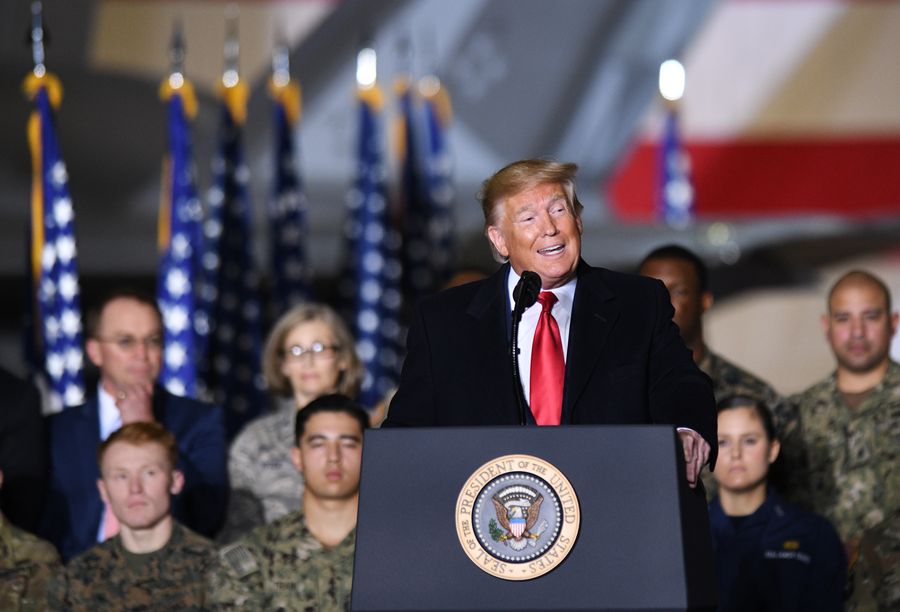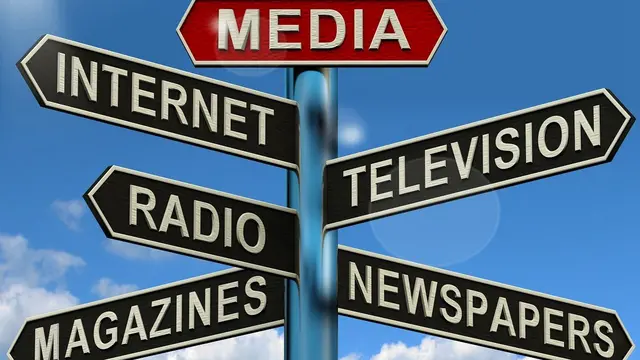
**Editor's note: **Bradley Blankenship is a Prague-based American journalist, political analyst and freelance reporter. The article reflects the author's opinions, and not necessarily the views of CGTN.
On August 10, Steven Perlberg writing for Digiday reported that media industry insiders are mulling over their business models at the thought of the defeat of U.S. President Donald Trump in November. The main problem is that despite a boom in business and purpose during the Trump era, the media industry has been undergoing a transformation for quite some time that could reemerge to the fore and hurt outlets once things return to "normal."
"What would go away is the bad guy in the story. There's no antagonist. So what are we tuning in for?" Digiday quoted Jonathan Klein, the former president of CNN as saying. "Grandpa (presumed Democratic nominee for President Joe Biden) is a nice guy. Everybody might be relieved to not watch as much cable news anymore and go find a book to read, a garden to plant, or a socially-distanced walk to take."
Klein knows a thing or two about narrative shifts after he himself was canned following a hit to ratings after the election of former President Barack Obama, owing this to post-election "fatigue" from viewers caught in the midst of the financial crash. Perhaps the most well-known bullseye for Trump's attacks against the media, CNN after parting ways with Klein leaned into its opposition status in this latest political era.
"This is an apple. Some people might try and tell you that it's a banana," a CNN ad from 2017 aimed at President Trump said.
"They might scream banana, banana, banana over and over and over again. They might put BANANA in all caps. You might even start to believe that this is a banana. But it's not. This is an apple."
Other media outlets adopted similar slogans aimed at broadening their subscriber bases. For example, even before CNN's advertisement, the Washington Post adopted the slogan "Democracy Dies in Darkness." The newspaper of record – the New York Times – also accepted its firmly anti-Trump role. MSNBC has hired contributors around the clock to criticize the president and paid so-called Russia experts wads of money to speculate on the non-story of the decade.

U.S. President Donald Trump speaks at a signing ceremony for the National Defense Authorization Act for Fiscal Year 2020 at Joint Base Andrews, Maryland, U.S., December 20, 2019. /Xinhua
This opposition market niche, however, is obviously not going to survive if Trump exits the White House. As Perlberg notes, anti-Biden media such as Fox News would be just fine in the new political era and independent left-wing outlets would fill another opposition niche. During the Obama years, Fox News ruthlessly invented countless non-scandals against the president and not only pandered to, but radicalized, its conservative viewership. Independent outlets on the political left, many online, also hammered away at Obama's hawkish foreign policy and coziness to Wall Street (to name a few issues).
This leaves large outlets like the New York Times, the Washington Post, CNN, MSNBC and others sympathetic to a centrist president on the hook to find a new direction in the eventual case that Trump exits office as soon as 2021.
There is obvious reason to doubt that, with how the "boring" Obama years were covered, Biden's administration would hardly be scrutinized by legacy media. Mass layoffs and other structural changes could affect the quality and quantity of reports about a President Biden. And if this week's Democratic National Convention is any indication, it seems legacy media is likely to pack it up and go home if Biden bests Trump in November.
But this is simply wrong. It would not only damage public discourse by making the public less aware of Joe Biden as president, it would also be a poor business decision.
"What Trump gave journalistic outlets was an audience that felt the urgency," Klein notes to Digiday. "Certainly if Trump loses, that urgency among 70 percent of the audience might dissipate a little bit, but you're still going to be in the midst of an economic calamity, this wrenching social debate over inequality and have a disease that may be killing tens of thousands of people a week."
Herein lies the solution to legacy media's woes: there will still be problems in America. Trump has ushered in an unprecedented political era – one where truth has been pushed to the margins and horrible things are said without fanciful dressing. Even if he loses, the ideologically rogue Republican Party will still be alive as ever, stopping any action by a Biden administration dead in its tracks thanks to the Senate filibuster.
Even without Trump and Republicans, times are still unprecedented – over 170,000 known COVID-19 related deaths in the country, tens of millions unemployed and even more facing eviction. This crisis – and everything that's led to it – deserves unrelenting attention and discussion.
Legacy media would do well to continue its oppositional role not simply against one party or one man, but against the very system that can even allow someone like Trump to ascend to political power. This should be the media's new antagonist in a post-Trump world.
(If you want to contribute and have specific expertise, please contact us at
.)
 简体中文
简体中文

